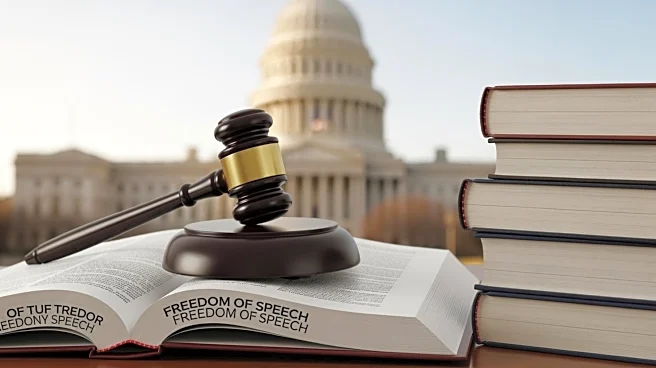What's Happening?
Defense Secretary Pete Hegseth has introduced new media restrictions at the Pentagon, which have raised concerns among journalists and defense officials. The policy, shaped with advice from Hegseth's personal lawyer Tim Parlatore, requires reporters to sign
a document acknowledging that requesting unapproved information is akin to soliciting government employees to break the law. Those who refuse to sign must leave the Pentagon. The Washington Post and other media organizations have declined to sign, citing infringement on First Amendment rights. Parlatore, who joined Hegseth's staff in March, has been influential in shaping these restrictions, despite internal scrutiny over his dual role as a military officer and legal adviser.
Why It's Important?
The new media restrictions at the Pentagon have significant implications for press freedom and transparency in government operations. By potentially limiting journalists' access to information, the policy could hinder the media's ability to hold the government accountable. This move has sparked concerns about the erosion of First Amendment protections, with critics arguing that it represents an attempt to evade scrutiny and accountability. The policy's focus on 'controlled unclassified information' could further restrict reporting on important defense matters, impacting public understanding and oversight of military activities.
What's Next?
The Pentagon anticipates legal challenges from media outlets against the new restrictions. The Pentagon Press Association has urged leaders to reconsider the policy, highlighting its potential to intimidate journalists and restrict information flow. As the policy takes effect, the response from media organizations and legal experts will be crucial in determining its future. The outcome of any legal challenges could set precedents for media access and government transparency, influencing how similar policies are crafted and implemented in the future.
Beyond the Headlines
The introduction of these media restrictions raises broader questions about the balance between national security and press freedom. It highlights the ethical and legal challenges of managing sensitive information in a democratic society. The policy's implications extend beyond immediate media access, potentially affecting public trust in government institutions and the perceived integrity of military operations. As debates continue, the long-term impact on journalistic practices and government-media relations will be closely watched.
















